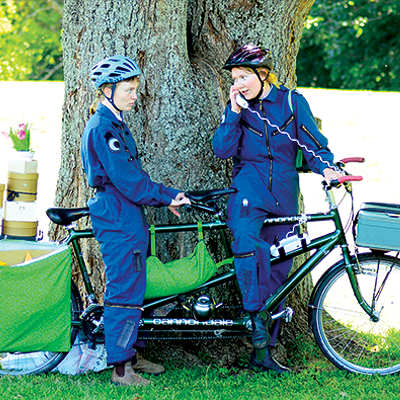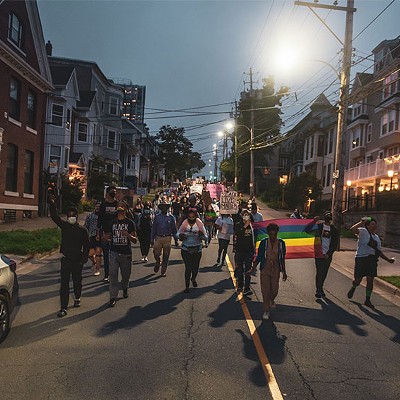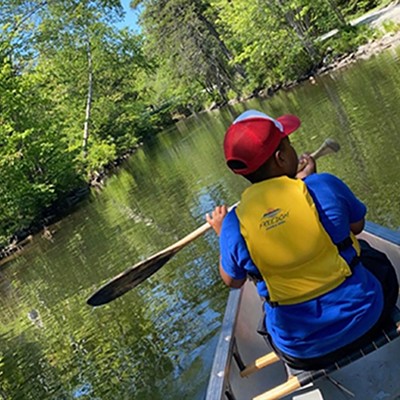She went out almost every day and rode 10 to 15 kilometres, 25 to 30 on the big days. Perhaps you passed her if you've driven out of Cole Harbour towards the eastern shore on Highway 207 in the past few months. It may have been a bright, sunny spring day, or even a slushy, inclement and wintry one. Either way, if you sped past a young woman on a raised saddle, straddling a single, large wheel, travelling on the highway shoulder, that was Beth Amiro. The Lawrencetown resident has been training for Ride the Lobster, a five-stage, 800-kilometre unicycle race, runningfrom Yarmouth to Baddeck, taking place June 16-20. In some respects, Amiro does look like those people you might have seen at the Buskers Festival or the circus, a performer denying gravity on a wheel, high in the air, seemingly always on the verge of tipping over but somehow managing to propel herself forward, arms tentatively outstretched to help maintain the delicate dance. The difference here is the wheel. At 36 inches in diameter, typical of a
racingunicycle, it's huge. "I find it easier to ride than the smaller one because the tire is bigger, so little things like sidewalk cracks and rocks don't trip you up," says Amiro. She's been riding her racing unicycle since October, but she only recently learned how to mount her "uni" without support. "Getting on the thing is pretty hard. A lot of people want to push forward, but that doesn't work. It's kind of counterintuitive. You actually have to backpedal, push the unicycle under you, get stable and then move forward." And that's not even the biggest challenge to mastering the unicycle, even for someone such as Amiro who first learned to ride one 20 years ago. "Going downhill is hard because you have to slow your speed, you can't coast like you would on a bike," she says. "You have to actually control the speed on pedals. I think the main thing is that people don't think you can learn because it looks daunting---but it's not that bad. I still learn new things. I'm still learning how to idle, how to bunny hop, jump off curbs. "And how to ride long distance is a whole other skill." Amiro, 28, could be a walking advertisement for how an outdoor, active lifestyle can benefit Nova Scotians, with her positive, can-do disposition, wind-swept blonde hair and bright, wide smile. Though she does computer systems project management as her day job, she lives near Lawrencetown Beach, where she loves to surf. In the summer she teaches at the One Life Surf School, the local operation that caters to female surfers. She's also an actor, having starred in Eva Madden's widely seen short film
Eastern Shore, where her character chooses the beach and surfing over a boyfriend in Halifax. The irony of the way the film paralleled her actual life is that she once did live in Halifax with her boyfriend---"It was a bad year," she says---but they both moved to the beach together. More recently, she became a stunt performer in the film and TV industry, following the recommendation of the stunt guy on
Eastern Shore, who admired Amiro's resilience in surfing scenes shot in frigid water. "He was like, 'Wow, you're tough!'" she says. "I did stunt training school and I started to do stunts after that. The most recent one I did was down in Electropolis. I was hanging in a dingy from the ceiling." So falling from a height holds no fear for Amiro, and the unicycle is certainly familiar. She got her first at age eight, having been inspired by performers at the Buskers Festival. She taught herself to ride a yard sale-purchased unicycle in five focused days, the way certain determined children do. "I started on the front steps of my houseone day I got one sidewalk square, and then I got two sidewalk squares, then I got around the drive. I cut my knees a lot, but I got it." In her teens she stopped riding, but picked it up again at age 20. "I started riding that around the city a little bit. I didn't commute or anything, it was just for fun." She read about Ride the Lobster in the
Chronicle Heralda year-and-a-half ago. "I was like, 'Oh my gosh, a unicycle race in Nova Scotia, are you kidding me? I have to do that.' I didn't really understand that unicycling long distance was like a thing that a lot of people did and did really well. I didn't understand that there was that kind of culture." The race features more than100 riders, broken down into approximately 35 teams of three (plus vehicle support). The three riders form a relay, passing off a GPS tracking device to each other while in motion through each stage. Amiro has teamed up with two guys from Cape Breton, Stephen Plumridge and Eric Morneau. Morneau has some previous experience with the unicycle, but Plumridge learned how to ride since hearing about the race. "We're in it for the fun," said Plumridge on CBC radio. "We're going to try to do about 20 minutes each [in the relays]. My personal goal for the race is to finish, to cross that finish line." The advantage of living here is that Amiro and her team, the only entirely Nova Scotian team---called the Nova Scotia High Rollers---have had the opportunity to train right on the course, including a section of highway they visited near Antigonish. "It was like the Cabot Trail, it was really tough," she says. "We actually didn't make it up some of the hills, we had some big bails and had to push the unicycle up." A handful of other teams also have Canadian members, but the bulk are from away, including some of the best riders in the world, representatives from the Philippines, New Zealand, Denmark and Finland, someof whom had to qualify for distance and speed in their own countries in order to be able to participate. Sam Wakeling, from England, will be competing. He holds the Guinness World Record for unicycle distance riding, 453 kilometres in 24 hours. Though there are other international unicycle races annually, this is the biggest one ever held. "They've never been this far, never done in a relay, and never done in stages as a race," says Heather LeBlanc, the race events coordinator on the phone from Granville Ferry. "These are extreme athletes. They don't mess about." The original inspiration for the race can be attributed to a Greenwood bookstore owner with a background in science and engineering, Edward Wedler. He's not a unicyclist, just an enthusiast, who was inspired by Max Demilner, an American student who cycled across six states to raise money for his college education and broadcast it on a website. "My interest is in satellite mapping and tourism," says Wedler, on the phone from his Greenwood business. "I wondered, how can I, in my own way, help boost tourism in the province?" The GPS technology will allow people to track the teams through 136 rural Nova Scotia communities via the internet in real time, a computer mapping technology that has been developed through a Nova Scotia company, Britech. Putting it together, Wedler roped in long-time friend LeBlanc to be part of his plan. "It was the whole idea of doing something that's never been done before in the world, that was intriguing," she says. Sherry Devanney is a Halifax filmmaker shooting a documentary on the race, called
(One)der Women, focusing on the 13 women who are competing. Devanney recently accompanied Beth Amiro on a trip to a grade school in Truro, where Amiro showed off her unicycle skills to the students. "The kids pretty much thought she was a rock star," says Devanney, who is thrilled to be covering the race and meeting the female riders. "It's a unique take on the universal tale of perseverance and triumph. We're hoping to inspire other girls to not be afraid of trying something new," she says. "I tried a unicycle once. It's hard but it's addictive." With all the media and multimedia attention, Amiro is a little anxious about being one of the few on the relatively inexperienced home team. "At first I thought it was a great idea, and now as it becomes more of a reality, it's getting scary," she admits with a laugh. "On the other hand it's like, 'Well done just fordoing it.'"a

Unicycle across Nova Scotia
Beth Amiro is the only Haligonian to Ride the Lobster, a race that is every unicyclist's Tour de France.
[
{
"name": "Air - Inline Content - Upper",
"component": "26908817",
"insertPoint": "1/4",
"requiredCountToDisplay": "8"
},{
"name": "Air - Inline Content - Middle",
"component": "26908818",
"insertPoint": "1/2",
"requiredCountToDisplay": "8"
},{
"name": "Air - Inline Content - Lower",
"component": "26908819",
"insertPoint": "100",
"requiredCountToDisplay": "1"
}
]















